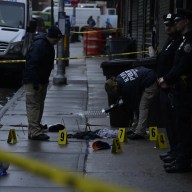By Philip Newman
The FAA announcement of its decision to curb the worsening congestion at LaGuardia came as anti-noise activists complained anew, with one appealing to local and federal officials to “restore to us the tranquil quality of life we once enjoyed.”
Severe delays at LaGuardia because of a new round of regional flights have disrupted air traffic in other parts of the nation.
The FAA said it would run a lottery among airlines operating what are called regional jet flights to determine which carriers can add new flights. The result is expected to be the elimination of at least 75 flights already operating out of LaGuardia along with others that were supposed to start up in the next few months. Tickets have been sold for some flights now in doubt.
The airlines were expected to respond to the FAA announcement by Wednesday, said FAA spokeswoman Arlene Salac.
An FAA spokesman called the lottery a “short-term measure intended to ease the chronic congestion at LaGuardia.”
The lottery is scheduled to expire in September 2001, after which the FAA said it hopes to come up with new ideas, perhaps to include charging airlines higher landing fees at peak hours to alleviate the problem.
“It appears to be a good idea if it works toward reducing flights and easing a steadily worsening situation at LaGuardia,” said Dan Andrews, a spokesman for Queens Borough President Claire Shulman.
“Of course, it will not take effect for a month at least and is a temporary solution,” Andrews said. “But it seems to strengthen our efforts to improve things at LaGuardia. Of course, our lawsuit still goes forward with our next court date on Dec. 11.”
Andrews was referring to a federal court suit the city of New York filed at Shulman's behest seeking a halt in the regional flights pending an environmental impact study.
U.S. Rep. Joseph Crowley (D-Jackson Heights) whose congressional district includes LaGuardia, applauded the FAA lottery.
“Congestion at LaGuardia Airport has reached record levels,” Crowley said. “While I am pleased that the FAA has finally responded … more still needs to be done to make LaGuardia a better neighbor.”
“We need to look at making the moratorium on new flights permanent, banning 'hush-kit' airplanes and implementing a curfew on any flights after 11 p.m.” he said.
In the FAA plan, airlines would participate in a lottery to determine which of them would be allowed to operate flights. In its first stage, startup airlines and airlines having fewer than 20 arrival and departure slots at LaGuardia would be permitted to select new arrival and departure times.
In the plan's second and third stages, airlines already providing service to underserved cities would be allowed to select slots. In the fourth stage, airlines could choose new flight times until all slots were filled.
Officials from the FAA, several airlines and the Port Authority of New York and New Jersey held a meeting last week at the World Trade Center following several weeks of discussions on the issue.
The plan to ration new flights at LaGuardia would involve only what the airlines call regional flights involving jetliners with 70 or fewer seats and offering flights to cities where a lack of competition had long meant exorbitantly expensive fares. A law known as AIR-21 passed by Congress last winter authorized an unlimited number of these flights from LaGuardia to such underserved airports.
After passage of the legislation, airlines quickly applied for hundreds of arrival and departure slots at LaGuardia with the result that at least 100 more flights a day were added, with plans for more.
The lottery system involves only the regional flights since regular flights are already limited by the High Density Rule that holds flights at LaGuardia and John F. Kennedy International Airport at present levels until the year 2007.
The Port Authority, which issued a moratorium on new flights in September, said it was a good idea.
“We welcome … the decision to work with the Port Authority to take innovative steps to conduct a lottery to relieve the growing problem of airline delays that plague LaGuardia Airport,” said Robert E. Boyle, executive director of the Port Authority.
LaGuardia had 9,000 flight delays in September, compared with 3,108 delays a year ago, and accounted for about 20 percent of all such delays in the United States, the FAA said in a study.
Shulman's office said a minimum of 150,000 people live close enough to LaGuardia to suffer from the noise of more than 1,200 takeoffs and landings every 24 hours.
David I. Weprin of the Holliswood Civic Association and a candidate for City Council, said residents of Holliswood, Queens Village, Hollis, Bellerose, Fresh Meadows and West Cunningham were “outraged at the diminution of their quality of life by the loud, incessant noise caused by departures and landings at LaGuardia.”
He called on “the mayor, our congresspersons, state legislators, borough president and City Council to take action to restore to us the tranquil quality of life we once enjoyed.”
Weprin said, however, that the FAA lottery “while it may not solve our problems, could be a step toward reducing the number of landings and takeoffs at LaGuardia.”
It would be the first time the FAA had intervened in airline scheduling since a nationwide strike by the air traffic controllers in 1981.
































